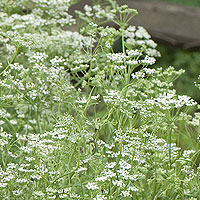Gluten Free
What does following a gluten-free diet mean? That you're embarking on an easy diet with a wide range of health-promoting effects. Instead of dwelling on what you’re giving up, consider that you’re going to enjoy a whole new world of delicious food options to meet your special dietary needs. You’ll be eating seasonally, choosing more fresh fruits and vegetables, focusing on meats, seafood, poultry, legumes, lentils, corn, and rice, and discovering fascinating ancient grains such as quinoa, amaranth, and millet. You’ll be able to eat potatoes, eggs, most cheeses, even chocolate (!)—and enjoy them without guilt because you’ll be taking good care of your body. In fact, you’ll probably end up eating—and feeling—better than ever!
Visit this page for more information about living Gluten Free
---
We carry a large variety of gluten free items, the brands listed below represent just some of the offerings we carry















More Diets
Anise
 © Martin Wall
© Martin WallHow It Works
The active constituents in anise, particularly the terpenoid anethole, are contained in its volatile oil. The volatile oil gives the plant a delightful flavor and has been combined with other less pleasant tasting medicinal herbs to offset their taste. The oil is also antispasmodic, helping to relieve intestinal gas and spasmodic coughs.3 Anise has been combined with cathartic laxatives to help reduce the spasmodic cramping they can cause.4 It may also have modest antiparasitic actions and has been recommended by some practitioners to treat mild intestinal parasite infections.5 Anethole has been documented to have phytoestrogen activity in test tubes and animals;6 the relevance of this to humans is unknown. No clinical trials have been conducted to support any of these uses, though anise is approved for use by the German Commission E for relieving coughs and indigestion.7
How to Use It
Three grams (1/2 tsp) of the seeds can be used three times per day to treat indigestion. To make a tea, boil 2 to 3 grams (1/2 tsp) of crushed seeds in 250 ml (1 cup) of water for ten to fifteen minutes, keeping the pot covered. Three cups of this tea can be drunk per day. It has been recommended to combine approximately 0.5 ml anise volatile oil with 4 oz (120 ml) tincture of anise and then take 10 to 30 drops (1/2 to 1.5 ml) of this mixture three times daily for coughs.8 The volatile oil can also be inhaled (by placing it in a vaporizer or in a steaming bowl of water) to help relieve a cough.9
Copyright © 2025 TraceGains, Inc. All rights reserved.
Learn more about TraceGains, the company.
The information presented by TraceGains is for informational purposes only. It is based on scientific studies (human, animal, or in vitro), clinical experience, or traditional usage as cited in each article. The results reported may not necessarily occur in all individuals. Self-treatment is not recommended for life-threatening conditions that require medical treatment under a doctor's care. For many of the conditions discussed, treatment with prescription or over the counter medication is also available. Consult your doctor, practitioner, and/or pharmacist for any health problem and before using any supplements or before making any changes in prescribed medications. Information expires December 2025.











